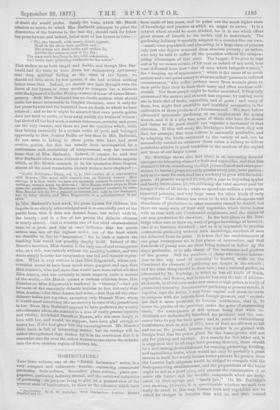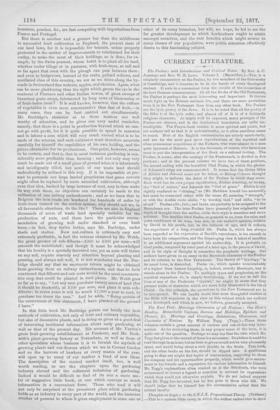HORTICULTURE.* Tins little volume, one of the " British Industries"
series, is a very compact and exhaustive treatise, embracing commercial gardening, fruit-culture, decorative .plant-culture, plant-pro- pagation, gardening industry abroad, and the collateral industries of gardening ; its purpose being to give us a general view of the present state of horticulture, to show us the advances which have
* Horticulture. By W. Burbidge, With Illustrations. London : Edward Stanford sad Co.
been made of late years, and to point out the much higher state of knowledge and practice at which we ought to arrive. It is a subject which should be more studied, for it is one which offers great means of benefit to the nation and to individuals. The gardening industry is specially adapted to a country like our own, —small, over-populated, and abounding in a large class of persons only just one degree removed from absolute poverty ; or rather, who may be said to suffer all the penalties without the compen- sating advantages of that state. The beggar, if be goes in rags arid is by no means certain of his next or indeed of any meal, is at least delivered from that " fear of man which bringeth a snare," the " keeping up of appearances," which is the cause of so much anxiety and consequent misery to what are called "persons in reduced circumstances," who suffer perhaps more from wounds given to their pride than they do from their many and often needless self- might be better nourished, if they only denials. For these people understood the matter, and at much less expense, by making more use in their diet of fruits, vegetables, and of grain ; and many of them, too, might find profitable and healthful occupation in the cultivation of these products of a bounteous soil. We have before advocated systematic gardening as an employment for young women, and it is a pity that some of those who have the means and desire to do good should not organise a movement in that direction. If they will study Mr. Burbidge's little book, they will find, for example, that fruit-culture is eminently profitable, and by adapting the kinds cultivated to the variety of soil, can be successfully carried on wherever there exists a railway to deliver perishable articles in good condition to the markets of the capital and those of our larger towns.
Mr. 13urbidge shows also that there is an increasing demand amongst our labouring classes for fruit and vegetables, and that this demand is likely, considering thehigh prices of meat and other pro- visions, to become proportionably greater every year, more Particu- larly as the taste for such food has a tendency to grow with its indul- gence. At present we spend £2,000,000 a year in importing apples and hardy fruits alone, £6,000,000 being the total amount paid for foreign fruits of all kinds ; while we spend one million a year upon imported potatoes, and very large sums for other kinds of early vegetables. That climate has much to do with the cheapness and abundance of production in other countries cannot be denied, but there are many sorts of fruit and vegetables which thrive better with us than with our Continental neighbours, and the causes of our non-production lie elsewhere. In the first place, as Mr. Our- bidge takes care to show us, want of proper knowledge of horticul- ture is an immense drawback ; and as it is impossible to practise commercial gardening without such knowledge, numbers of men are debarred from its gains. It is true that the establishments of our great nurserymen are in fact places of instruction, and that hundreds of young men are there being trained to follow up the same profession, or to take charge of the hothouses and gardens of the gentry. Still the numbers of those who receive instruc- tion in this way must of necessity be limited, while on the Continent the elements of gardening are taught in the schools ; and the same thing should be done here ; and a national garden, as advocated by Mr. Bnrbidge, in which to test all kinds of fruits, vegetables, and flowers, and to render less easy the sale of adulter- ated seeds, or of old sorts under new names at high prices, is really of paramount necessity. As coinmercial gardening at present stands, it requires, says the writer, a very large capital and stock-in-trade to compete with the imports from foreign growers, and "capital- ists find it more profitable to become middlemen, that is, to lower the profits of the producer, under the guise of augmenting trade," the consequence of this system being that while in- dividuals are undoubtedly benefited, the producer and the con- sumer have to pay for their gains ; and in years of extraordinary fruitfulness, such as that of 1875, tons of fruit are allowed to fall and rot on the ground, because the market is so glutted with foreign fruit that the prices given for the home-grown will not pay for picking and carriage. As a remedy for this latter evil, it is suggested that in all large fruit-growing districts, there should be a well-managed establishment for canning, preserving, bottling, and crystallising fruits, which would not only be probably a great success in itself, but would furnish better prices to the grower, since the London froit-salesmen would be obliged to compete with the fruit-preserving establishments, and the preparations of the latter ought to sell at a good price, and prevent the consumption uf so much vile butter, and the horrible compounds which are desig-
nated as fruit-syrups and "family jam." On Mr. Burbidge's own showing, however, it is questionable -whether we shall ever really do much in this way, because fruit and vegetables can be raised far cheaper in America than with us, and their canned
tomatoes, peaches, &c., are fast competing with importations from France and Portugal.
But there is another and a greater bar than the middleman to successful fruit cultivation in England, the present state of our land laws, for it is impossible for tenants, unless properly protected in the matter of improvements or reimbursed for their outlay, to make the most of their holdings, as is done, for ex- ample, by the Swiss peasant, whose habit is to plant all his land, whether under tillage or in pastures, with fruit-trees, so tall and so far apart that oxen with the plough can pass between them ; and even in hedgerows, instead of the crabs, pollard willows, and mutilated elms of this country, we see as we drive along the by- roads in Switzerland fine walnuts, apples, and cherries. Again, what can be more gladdening than the sight which greets the eye in the contorni of Florence and other Italian towns, of great sweeps of luxuriant grain-crops, intersected by long rows of blossoming or of fruit-laden trees ? It is well known, however, that the culture of vegetables is even more remunerative than that of fruit,—in many cases, they can be best carried out simultaneously. Mr. Burbidge's statistics as to these matters are well worthy of attention, and he gives one very useful reminder, namely, that there is a point in production beyond which we can- not go with profit, for it is quite possible to spend in manures and in labour a sum which will very much exceed what is to be made of the returns, and each cultivator must therefore ascertain Carefully for himself the capabilities of his own holding, and the prices obtainable for its productions. One point, however, seems to be certain, and that is, that in most instances gardening is con- siderably more profitable than farming ; and not only may very much be made out of a small piece of ground when it is laboriously and intelligently tilled, but much of our waste land should undoubtedly be utilised in this way. If it be impossible at pre- sent to persuade our largo landed proprietors that game coverts might often be replaced by more extended cultivation, although even that idea, backed by largo increase of rent, may in time make its way with them, no objection can certainly be made to the utilisation of our railway embankments ; and as we learn that in Belgium the iron roads are bordered for hundreds of miles by fruit-trees trained on the cordon system, why should not we, in all favourable situations, do the like ? There are also in England thousands of acres of waste land specially suitable for the production of nuts, and these have the particular recom- mendation of growing well under standard or even bush trees,—in fact, they thrive better, says Mr. Burbidge, under shade and shelter. Now nut-culture is extremely easy and extremely profitable, in fact the returns obtained by Mr. Webb, the great grower of cob-filberts—£.200 to 1300 per acre—will astonish the uninitiated ; and though it must be acknowledged that his locality is a specially favoured one, yet as nuts will thrive on any soil, require scarcely any attention beyond planting and pruning, and always sell well, it is not wonderful that Mr. Bur- bidge should say that an enormous return might be obtained from growing them on railway embankments, and that he feels convinced that filberts and cob-nuts would be the most remunera- tive crop that could be planted in such places. Mr. Webb goes so far as to say, "Let any man purchase twenty acres of land (for it should be freehold), at £100 per acre, and plant it with cob- filberts; in seven years it will be worth £1,000 a-year to rent, to purchase ten times the cost." And he adds, "Being certain of the correctness of this statement, I have planted all the ground I have."
In this little book Mr. Burbidge points out briefly the best methods of cultivation, not only of fruit and culinary vegetables, but also of decorative plants, and in doing so gives us a good deal of interesting incidental information about early gardening, as well as that of the present day. His account of Mr. Varden's great fruit-growing establishment at Pershore, and Mr. Beck- with's plant-growing factory at Tottenham, as well as those of other specialists whose business it is to furnish the myriads of growing plants and cut-flowers which we see in Covent Garden and on the barrows of hawkers at every season of the year, will open up to many of our readers a fund of new ideas. The description of the central market itself, toe, is well worth reading, as are the chapters upon the gardening industry abroad and the collateral industries of gardening. Indeed it would be difficult to find of its size a more use- ful or suggestive little book, or one which conveys so much information in a convenient form. Those who read it will not only be surprised at the prominent place which gardening holds as an industry in every part of the world, and the immense number of persons to whom it gives employment in some one or
other of its many branches, but will, we hope, be led to see the far greater development to which horticulture ought to attain amongst ourselves, and the vast benefits which might accrue to many classes of our population, were public attention effectively drawn to this fascinating subject.































 Previous page
Previous page